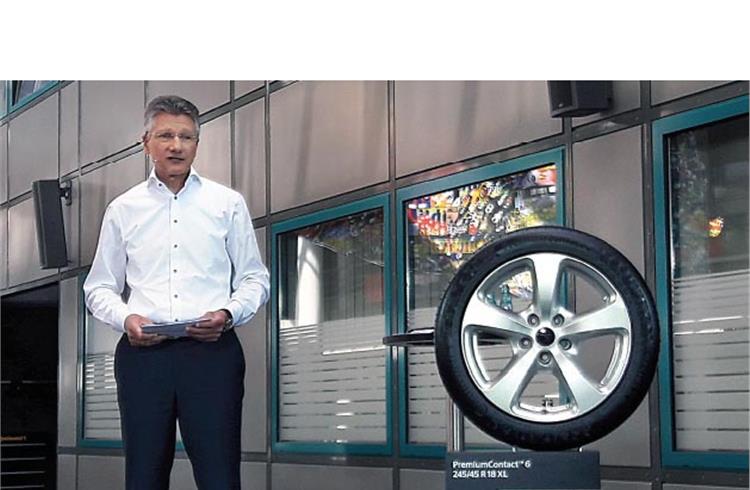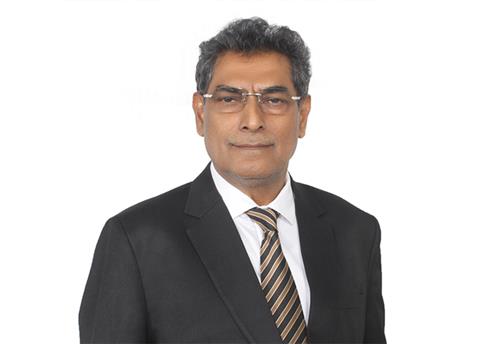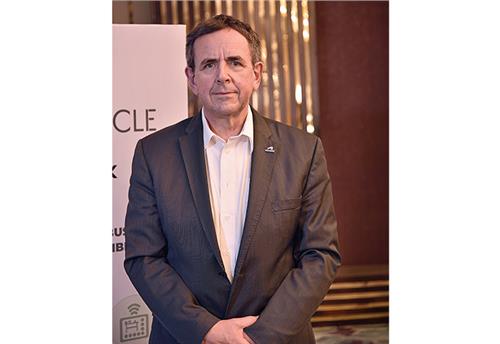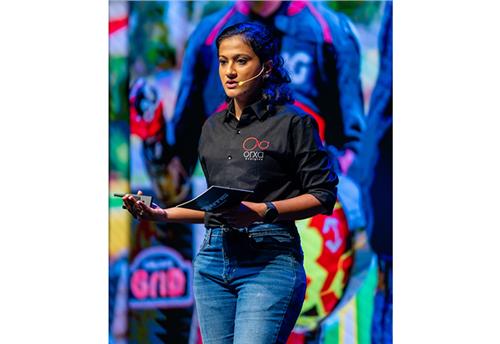‘I could imagine India is developing into an artificial intelligence competence hub for Continental in the future.’
Assisted driving will help reduce fatalities and accidents significantly in the next years. There are still 1.3 million fatalities at the road in the world (each year).
Dr Elmar Degenhart, chairman of the executive board and CEO, Continental speaks to Sumantra Barooah on electrification as the absolute future, acquisition cost of an EV and the efforts in bringing down cost of EV technologies.
You are betting a lot on electrification, connectivity/ connected cars and autonomous driving — the three key mega trends of the industry, aren’t you?
That's correct. Yes, I think we are well positioned in all three areas. We know relatively well what will happen at the side of assisted autonomous driving in the next 5, 6, 7 years because we are living in the midst of this scenario already.
We are using assisted systems on the road daily in high volumes. We already generate sales of 1.2 billion euros with sensors for assisted driving, and will go up to far beyond 2 billion euros by 2020. It's the fastest growing product segment in our company. Assisted driving will help reduce fatalities and accidents significantly in the next years. There are still 1.3 million fatalities at the road in the world (each year). We have to bring this number in the direction of zero, and this is possible with today's technologies.
Do you see electrification as the absolute future of the automotive industry, or are there any grey areas, whether electrification will become a mainstream propulsion technology of the automotive industry for all stakeholders to invest in it now, or should they wait for another five years?
Electrification will play a major role in the industry in the future. We have to make combustion-type technology clean to be able to fulfill the regulations not only for 2020 but also for the time afterwards. This is because electrified vehicles will be available with affordable technology not before 2024- 2025 kind of a timeframe. Thus, we need a kind of a bridge technology in between, and these are the hybrid vehicles where we combine the advantage of electric drivetrains at a small scale with combustion type of engines. Mild hybrid systems 48 volt, full blown hybrid systems and high voltage systems for heavy vehicles.
Why do I say that high volumes of pure electric vehicles will not kick in before 2024-25 timeframe? Because the battery cell technology (lithium-ion based) which we have today, does not have the energy density which we need to bring the battery volume, weight and especially cost to a reasonably affordable level.
Probably, we need another technology step, probably we will move towards what we call solid state technology where we have solid electrolyte and no longer liquid one. All experts are saying that this technology, most probably, will not be available before the 2023-24 timeframe.
The acquisition cost of an EV is still the biggest hurdle for the end customer. Only reduction in battery cost will not help. Both OEMs and suppliers will have to put extra efforts to bring down cost. How much effort is Continental putting to bring down cost of EV technologies?
All kinds of systems have to make a contribution. For example, we have to reduce weight and replace metal parts which we are using today with plastic parts. Our ContiTech division is doing this, for example. We have to reduce the rolling resistance of the tyres significantly. Our tyre division is taking care of that. So, we have to make multiple contributions to make driving more efficient, and to bring emissions down. But, to come back to your question, we also believe that we should not only purely rely on combustion and electric driving. The other opportunities like synthetic fuel which can be produced in a CO2-neutral way. Still the costs are too high, but we can also work on the manufacturing processes to make synthetic fuel really competitive.
I would not leave hydrogen completely out of the picture. Probably it takes longer to industrialise hydrogen, to make it competitive cost-wise than electric drivetrains. This is probably a technology for 2030 or beyond, but we should not stop working on these alternatives.
Could you tell us about the role India is going to play for Continental, not only as a market, but also a development hub for engineering? I understand the India Technical Centre is playing a key role in developing Artificial Intelligence.
You are absolutely right. The interests are two-fold. It is a highly interested market, and we have production facilities in India, and we believe that India can be the next growth engine for the automotive industry, once growth rates naturally are coming down in China. That would be a fantastic perspective not only for the automotive industry.
India has a very high-quality educational system, and a big number of talents are leaving the universities each year. This is Continental's second pillar in India. We are using India as an R&D hub intensively. We have more than 2,000 software engineers in India already, and the number is continuously growing. People coming from universities also Artificial Intelligence competence. So, I could imagine India is developing into an Artificial Intelligence competence hub for Continental in the future.
Lastly, if I were to ask you to do some crystal ball gazing for the global auto industry in 2025, with a little extra focus on emerging markets like India, how do you see industry in terms of mobility, supply chain or manufacturing?
It's an exciting industry to work in. Electrification, autonomous driving and connectivity are all materialising in parallel. Cars will look really different 10 years from now. The cities are changing. We will see shared mobility concepts in big cities, and India has big cities. So, to be able to make a contribution to more intelligent, smarter and clear driving for the sake of the whole society is a great thing to do.
(This interview was first published in Autocar Professional's 1st July Issue)
RELATED ARTICLES
BRANDED CONTENT: 'We aspire to be among the leading sensors and electro-mechanical products manufacturer'
P. Parthasarathy, Founder & Managing Director, Rotary Electronics Pvt Ltd shares the company's commitment and vision to ...
‘Big opportunity for startups lies in products in India’: Detlev Reicheneder
As electrification levels the playing field, the focus on tech and R&D to bring innovative products is the mantra for st...
'I hope my journey makes people say — I can do this too'
Ranjita Ravi, Co-founder of Orxa Energies — the maker of Mantis e-bikes — shares the challenges of building a startup an...





 07 Aug 2017
07 Aug 2017
 7850 Views
7850 Views





 Autocar Pro News Desk
Autocar Pro News Desk




